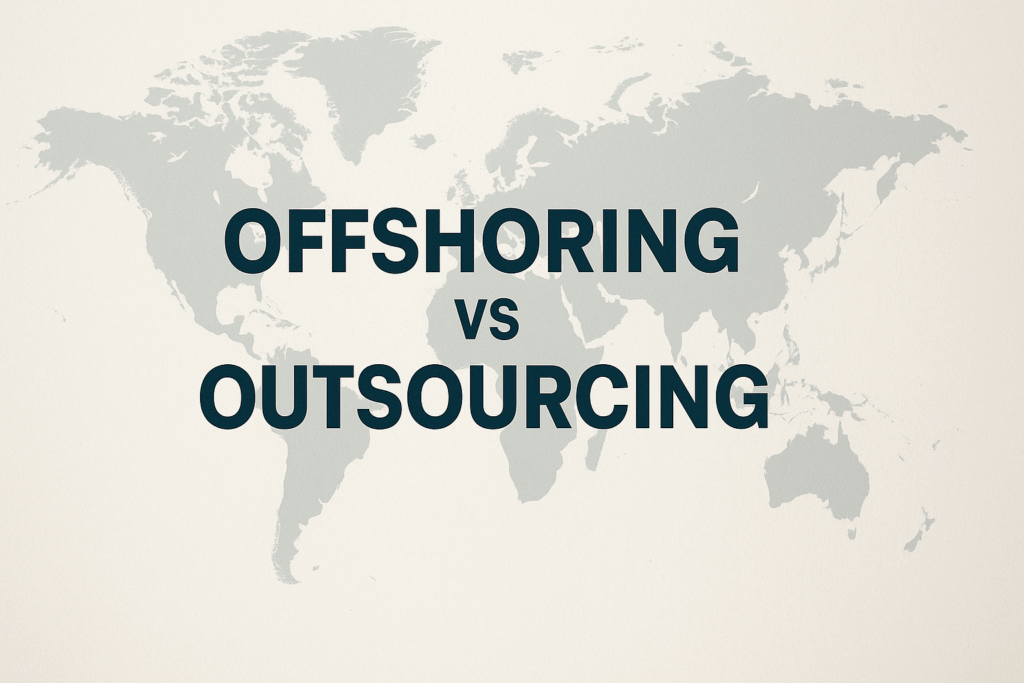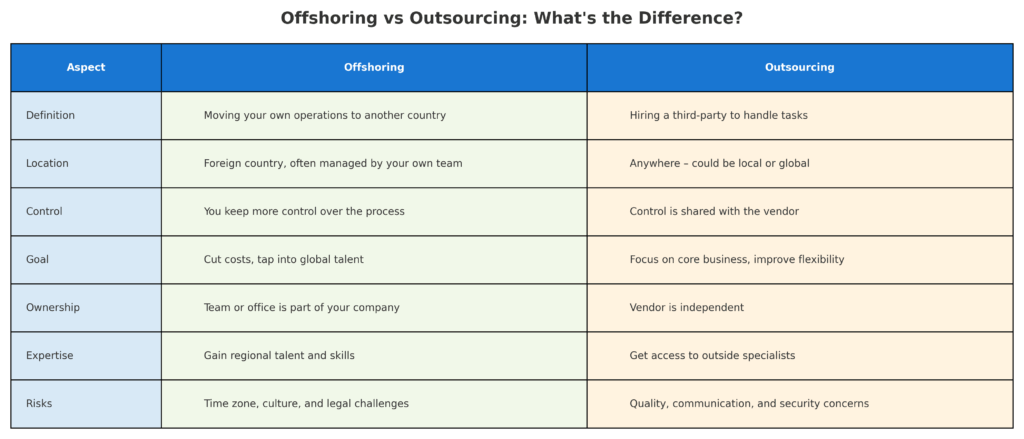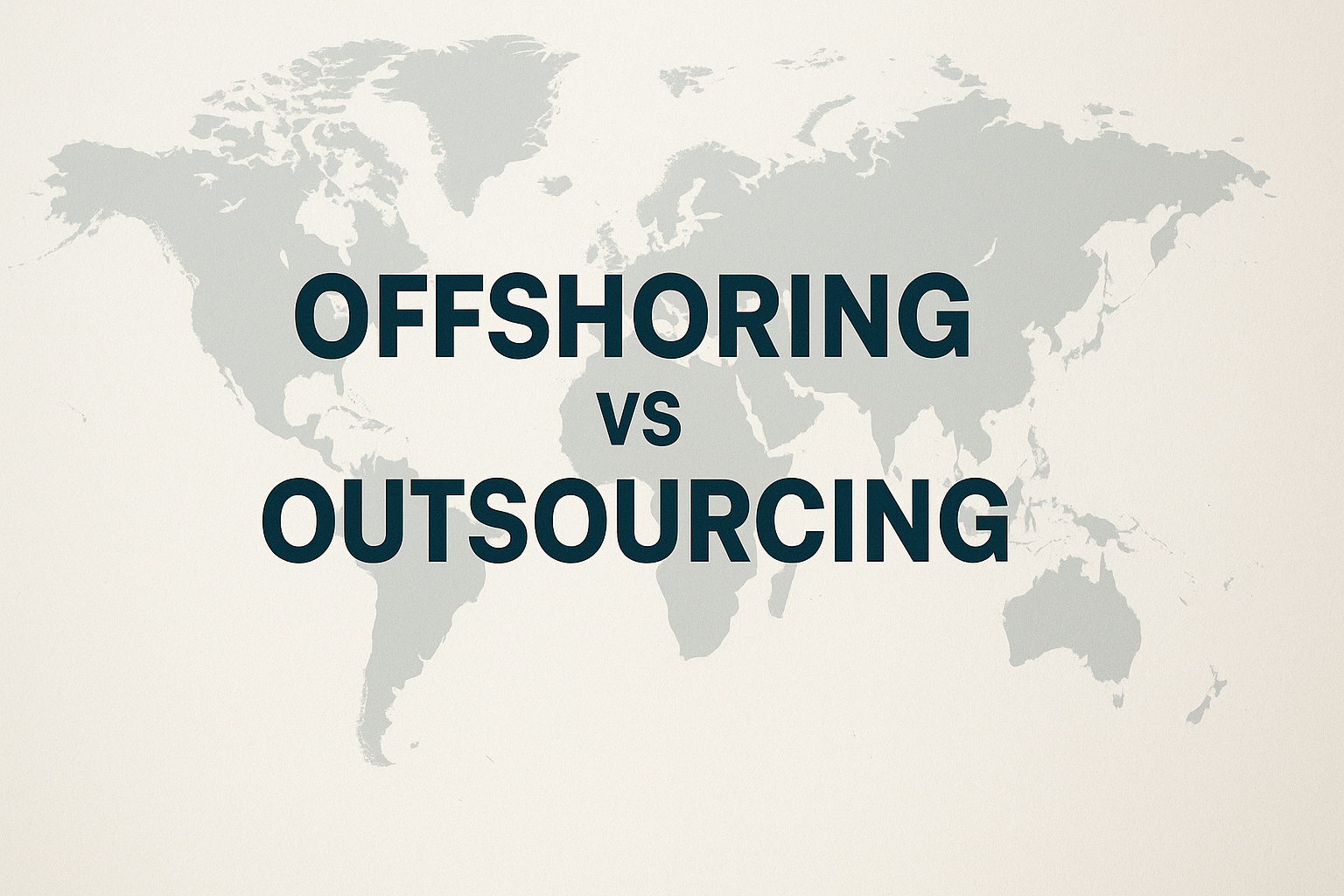Offshoring vs Outsourcing: Which One is Best for Your Software Project?

As your business grows and competition increases, finding ways to save money, work more efficiently, and access the right talent becomes essential. That’s where two popular strategies come in — offshoring and outsourcing.
Though people often use these terms interchangeably, they’re not the same. Each one has its strengths and fits different business needs. Choosing the right one can make a big difference in how your software project turns out.
In this article, we’ll explain what offshoring and outsourcing really mean, highlight the pros and cons of each, and help you decide which one is right for your project.
What is Offshoring?
Offshoring means moving certain business activities — like software development — to another country. Companies often offshore to save money, access skilled talent, or expand into global markets.
Sometimes, businesses create their own remote teams in another country. For example, a U.S. company might open an IT office in India to hire experienced developers at a lower cost. This is called captive offshoring.
Key Features:
- Work is done in another country
- Often focused on lowering costs
- Can use internal teams or external partners
- Common in IT, manufacturing, and customer service
What is Outsourcing?
Outsourcing is when you hire a third-party vendor to take care of tasks that your internal team would normally handle. This helps reduce workload, cut costs, and allow your team to focus on core business activities.
Outsourcing can be:
- Onshore (within your own country)
- Nearshore (to a neighboring country)
- Offshore (to a distant country)
So while offshoring is about where the work happens, outsourcing is about who does it.
Key Features:
- Work is done by an outside provider
- Focus is on expertise and efficiency
- Can be local or global
- Used for services like software development, customer support, payroll, and more

Pros & Cons of Each Strategy
Offshoring – Advantages
- Lower costs: Save on labor and operations in countries like India or Eastern Europe.
- Global talent: Hire skilled professionals at competitive rates.
- 24/7 work cycle: Time zone differences can boost productivity.
- Tax perks: Some governments offer incentives for foreign businesses.
Offshoring – Disadvantages
- Communication delays: Time zones and languages can create misunderstandings.
- Supervision challenges: Harder to manage remote teams directly.
- Legal risks: Different rules and regulations in other countries.
- Cultural gaps: Business practices may differ.
Outsourcing – Advantages
- Focus on what matters: Your internal team stays focused on core goals.
- Quick expert access: Tap into skilled professionals as needed.
- Lower hiring burden: No need to train or onboard new internal staff.
- Flexible and scalable: Easily ramp up or down based on your needs.
Outsourcing – Disadvantages
- Quality concerns: Results depend on the vendor’s performance.
- Vendor dependency: Risky if the vendor underperforms or exits.
- Data risks: Sharing sensitive info with third parties can be risky.
- Lack of company knowledge: External teams may not fully understand your brand or customers.
Key Trends You Should Know
Modern offshoring and outsourcing are smarter than ever. Here’s how things are changing:
- More complex tasks are being outsourced — Not just IT support, but AI, analytics, and R&D.
- Nearshoring is gaining popularity — Companies are partnering with nearby countries to avoid major time zone gaps.
- Data security is a top priority — Especially with GDPR and HIPAA regulations.
- AI and automation are being used more — Making outsourced work faster and more efficient.
- Remote teams are the norm — Tools like Zoom and Slack are helping international teams work better together.
So, Which One Should You Choose?
It depends on your goals. Here are a few things to think about before deciding:
1. Your Business Goals
- Need long-term stability and control? → Offshoring
- Short-term or one-time project? → Outsourcing
2. How Much Control You Need
- Want hands-on control over your remote team? → Offshoring
- Okay with letting an external partner take over? → Outsourcing
3. Cost Considerations
- Offshoring offers long-term savings, especially in countries with lower labor costs.
- Outsourcing can be cheaper upfront, but long-term costs vary based on the vendor’s rates.
4. Timeline
- Need something done fast? → Outsourcing
- Planning for long-term growth? → Offshoring
5. Communication & Time Zones
- Offshore teams may be harder to reach during your hours.
- Nearshore or onshore outsourcing offers better real-time communication.
6. Budget
- Outsourcing is flexible and doesn’t need much initial investment.
- Offshoring may cost more to start, but saves money in the long run.
7. Skill Gaps
- Missing specific expertise in-house? → Outsourcing
- Want to build your own skilled team overseas? → Offshoring
If you’re looking for long-term savings, more control, and access to international talent, offshoring might be your best bet.
If you need speed, flexibility, and fewer management headaches, outsourcing could be the smarter choice.
There’s no one-size-fits-all answer. Think about your goals, your budget, how quickly you need to get started, and how much control you want to keep.
At Virtual Sys Technologies, we help businesses across industries build reliable, cost-effective software solutions — whether through offshoring or outsourcing.
Talk to our experts today and discover which approach is the best fit for your next software development project.



